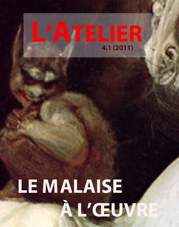Malaise dans la littérature australienne
Keywords:
Exile, Alienation, ColonialismAbstract
Our starting point is less the Freudian definition of the “discontent in the culture” as a product of the instinctual repression experienced by the members of all cultural communities than the concept of “Unheimlichkeit” or uncanny, which is more relevant to the Australian experience.
The Europeans who settled in Australia were baffled by the country’s strangeness which prevented them from feeling at home there, from feeling Australian. To this sense of alienation must be added the guilt left by the dispossession of the Aborigines. Those features of a postcolonial culture find frequent expression in Australian verse and fiction, and the article examines various strategies (denial, displacement, reversal, etc.) implemented by the writers to overcome their existential malaise. After more than two centuries of colonisation, white Australians have become used to their environment and have learnt to love it. At least this is the way it looks, but the repressed malaise returns all the same, taking oblique forms.
To overcome its malaise, Australian culture, including of course the literature, has to abandon its vain striving after purity and on the contrary make the most of the hybridity that characterises it far more surely than its Anglo-Saxon origins. The cultural contribution of ethnic minorities, in particular the Aborigines, is essential to create a genuine bond between man and his environment. The experience conveyed by those minority writers allows a transformation of the Australian imaginary, and thus a refoundation of the sense of identity.
Notre analyse partira non pas tant de la définition freudienne du « malaise dans la culture » comme produit de la répression instinctuelle qu’impose toute communauté culturelle à ses membres, que du concept d’inquiétante étrangeté (Unheimlichkeit ou uncanny) qui semble plus pertinent à l’expérience australienne.
Les Européens venus s’établir en Australie ont été déroutés par l’étrangeté du pays, qui ne leur a pas permis de s’y sentir chez eux (heimlich) et de se faire tout à fait australiens. A ce sentiment d’aliénation s’ajoute un sentiment de culpabilité laissé par la dépossession des Aborigènes. Ces caractéristiques d’une culture postcoloniale s’expriment fréquemment dans la poésie et dans la fiction australiennes, et l’article examine diverses stratégies (déni, déplacement, renversement, etc.) mises en œuvre par les écrivains pour surmonter leur malaise existentiel. Après plus de deux siècles de colonisation, les Australiens d’origine européenne ont fini par s’habituer à leur environnement, et même à l’aimer. Du moins en apparence, car le malaise refoulé fait néanmoins retour en prenant des formes détournées.
Pour surmonter le malaise, il faut que la culture australienne, y compris bien sûr sa littérature, abandonne ses vaines prétentions à la pureté et fasse au contraire son miel de l’hybridité qui la caractérise plus sûrement encore que ses origines anglo-saxonnes. L’apport culturel des minorités ethniques, en particulier les Aborigènes, est essentiel pour que se crée un lien authentique entre l’homme et son environnement. L’expérience transmise par les écrivains issus de ces minorités permet une transformation de l’imaginaire australien et par là une refondation du sentiment d’identité.
Published
Issue
Section
License
- Work submitted for publication must be original, previously unpublished, and not under consideration for publication elsewhere. If previously published figures, tables, or parts of text are to be included, the copyright-holder's permission must have been obtained prior to submission.
- Authors of accepted manuscripts will assign to L'Atelier the right to electronically distribute their article, or publish it in any form (Internet, CD ROM, printed copy) but authors will retain copyright and, after the article has appeared in L'Atelier, authors may republish their text (in print and/or electronic form) as long as they clearly acknowledge L'Atelier as the original publisher.


